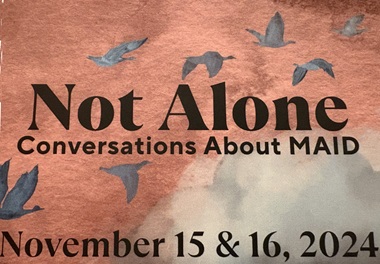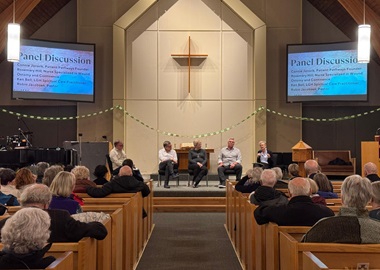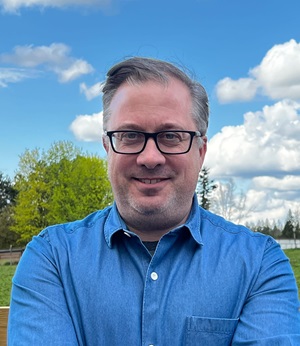 Recently I was part of a team that put together a conference on MAiD (Medical Assistance in Dying).
Recently I was part of a team that put together a conference on MAiD (Medical Assistance in Dying).
Two ministers that I know approached me and the non-profit organization with which I work, to see if we might together plan the gathering. Several people in their churches had come to them asking about the topic and we determined to put something together that we hoped could be of help.
Now, writing after the conference, I have heard from many who attended with expressions of gratitude for even being willing to take on the sometimes controversial topic, and to help people talk about things that are often left undiscussed. Who wants to talk about end-of-life planning or what decisions need to be made if we face a terminal diagnosis?
Presence of community
For myself, being part of the planning team and attending as well, many thoughts and considerations come up. The interest was beyond our anticipation; we thought maybe 50 people might attend, but there were approximately 120.
Part of what we hoped for was for people who attended to know that we are not alone and that we will not be alone when facing times of great difficulty, even in the context of dying and death. It is up to those who attended to discern whether that hope was accomplished.
As a planner and as one attending my own reflection on that is layered. As a pastor I think I always come away from such events both trusting and praying. “Dear God, may it be that people who were there would know that they are not alone. May they know your presence. May they know the presence of the community around them.”
I can say I am grateful for those who gave of their time and energy to speak and present and attend. I am humbled by them. We are all in this together.
That common identity is something that I find compelling in faith right now.
What is the same?
When I was in my teens, new to Christian faith, I found myself in a stream of formation that stressed difference. You might be well familiar. This frame of relating to those who did not share Christian faith depended heavily on particular verses in the Bible;
“You are salt and light.” – from the Gospel of Matthew
“Be in the world, but not of the world.” – from the Book of Romans
Much of my Christian formation depended on this perspective. I threw out my ‘secular music.’ I became immersed in an evangelical Christian sub-culture which, at times, seemed to aim to have an alternate expression of things of ‘the world.’ Christian gatherings, Christian entertainment, for some people Christian schools. We were ‘set apart.’
In consideration of the conference on MAiD, however, I have been holding a question.
What if we can speak of faith and reflect the love of Jesus compelled by an awareness of what is the same about us? As a pastor I have attended many death beds and sat with many families gathered around as their loved one died. One of the things that happens from my Christian faith in those times is that I see what is the same about such families and people, whether they claim Christian faith or not.
My faith seems most enlivened, in such times by this awareness, not by an awareness of difference. I do wind up praying silently in every such occasion, “Dear God, may I know your presence here, in this moment, with these people and for this child of yours facing death.”
In other words, around death, in those rooms, my particular stance on a moral issue virtually never comes into what it means to be present.
Hospice visit
I think of a relatively recent encounter having to do with MAiD. One of the spiritual care advisors (chaplains) from the local hospital contacted me about a woman who was in hospice. She was asking for a minister to visit her, partially for her to see whether she would be okay with that minister presiding over her funeral. She was scheduled for MAiD just a few days later. The chaplain told me that she was a bit of a handful, but he anticipated that she and I might connect. He knows me well; I have worked with him for years as a volunteer chaplain.
Within hours I was visiting her at the hospice. She was a character indeed. Her body may have been breaking down, but the sharpness of her mind and wit was remarkable. She was funny and sarcastic and clearly grateful for her life. In little time we were laughing and talking like old acquaintances or friends.
Her death was scheduled for two days later.
She had made the decision and was outlining her final hours as you might a busy week ahead. I don’t know how close she was to death if she had not chosen MAiD.
Her plan included not only the time of her death, but events leading up to it. She had notes and segments of time blocked off into hours and in some cases even 15-minute segments. A lot of people wanted to visit, and she had decided which ones would get half an hour and which ones would get less. I didn’t know what to make of all of this, but it was something.
As she told me her plans, she asked me several questions about my faith and my approach as a pastor to funerals. She did not want some minister doing one of those angry “You’d better believe, or else?” sermons at her funeral. She had heard enough of those growing up and was not interested. I felt like it was a job interview, but I had a sense of freedom as well because I could truly just be myself with her.
I got the job.
She told me that she had a plan for me as well just before she died. She wanted me to visit with her and to pray for her an hour before the scheduled time. After that I was to leave the room and then visit with her family before they went in to be there when it happened.
‘Reflect your love and care’

The conference on MAiD was held at North Lonsdale United Church (pictured here) and St. Andrew’s & St. Stephen’s Presbyterian Church.
In the engagement with her and with her family I carried the same prayer I hold in every similar circumstance. “Dear God, help me to notice your presence and would you grant the grace that, in humility, I might reflect your love and care.”
I have found that what is of virtually no use at all, in such encounters, is my particular view or stance on an issue.
There is an ethical and legal conversation and debate ongoing around MAiD; it is an important one. I have my own views on the topic and am aware of the cautions and questions.
However, the tendency in my faith, from an early age, to approach the world and other people based on difference fades away at times such as those in that room, with that person and her family.
We are asking many of the same questions. We can be present for one another.
Sharing faith
I have been wondering about this in the context of sharing faith. I have found true sharing of faith, hopeful witness to the love of Jesus Christ, has been more natural and real when I am aware of what is the same, not what is different.
I am praying about such things.
The recent conference brought out some of these hopes and some of the tensions. The approach that is more, “Here is what the world needs to know” is one that remains and is often compelling for some Christians.
It is true that Christian faith does not hold individual autonomy to be an ultimate virtue. As a pastor however, I have seen that non-Christians are often just as guided by a sense of the communities, families and world of which they are apart.
It is true that Christian faith holds a fulsome, if at times unclear, view of suffering. Suffering is not to be avoided at all costs. We can encounter self and one another and God in the midst of suffering in ways that are unlikely otherwise.
As a pastor, however, I have seen non-Christians grapple with such questions around suffering just as much as Christians do.
‘On the same plane’
As I consider how what is common might be a better ground upon which to speak of faith, I find myself coming back to a few expressions from Karl Barth. They don’t tie things up neatly for me. They simply help in the consideration and prayer.
Barth said that the division between believer and unbeliever is unhelpful in faith and life. He said that as Christians, if we use the term unbeliever, we should do so only to refer to ourselves. I am also compelled by a picture that he drew with words. He said that Christians and non-Christians are all on “the same plane.” Christians are not on higher plane. I think that this is true morally as well as spiritually.
I offer a couple of quotes from Barth in hopes of spurring such prayer and consideration for you as well.
In the following Barth does not mean to imply that non-Christians are worse than Christians. He uses the distinction to reveal our own biases:

Todd Wiebe
The better can have a part in God only in the most loyal solidarity with the worse, not in contrast and contradistinction to them. (Church Dogmatics IV.3 p. 404)
We cannot insist too sharply that we do not love for any external reason, with any ulterior motive or in the execution of any design or purpose. The one who loves does not want anything except to love, except more and more fully and seriously and perfectly to give themselves, to enter into relationship with the loved one. If there is any other plan or project – however noble – it means that love is betrayed and ended. (Church Dogmatics IV.2 p. 788)
Todd Wiebe is Director of the Reflector Project, a non-profit organization focused on hopeful theological renewal. He is Teaching Pastor at Cap Church in North Vancouver, co-host of the podcast Rector’s Cupboard and writes a substack newsletter called, Evangelically Departed.
He has written this comment as a member of The Bell: Diverse Christian Voices in Vancouver.
